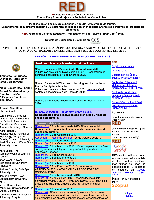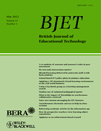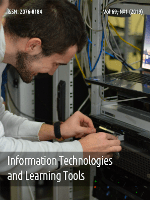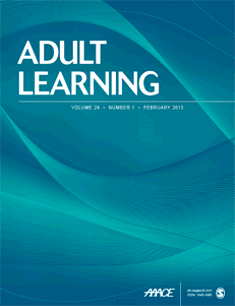
Educar
Scope & Guideline
Unlocking Insights in Education and Human-Computer Interaction
Introduction
Aims and Scopes
- Educational Technology Integration:
Research on the incorporation of digital tools and technologies into teaching and learning processes, including studies on digital literacy, the use of artificial intelligence in education, and the impact of ICT on educational outcomes. - Inclusive Education Practices:
Exploration of methodologies and frameworks that promote inclusivity in educational settings, focusing on the needs of diverse learners, including those with disabilities, gender differences, and socio-emotional aspects. - Lifelong Learning and Professional Development:
Investigations into lifelong learning frameworks, teacher training, and professional development initiatives aimed at enhancing educators' skills and competencies in response to evolving educational demands. - Socio-emotional Learning:
Studies examining the role of socio-emotional skills in education, particularly in relation to student well-being, motivation, and the learning environment. - Sustainable Development Goals (SDGs) in Education:
Research focused on how educational practices and curricula address the SDGs, promoting sustainability and global citizenship among learners.
Trending and Emerging
- Digital Competence and Literacy:
A notable increase in research focused on digital skills among educators and students, particularly in the context of integrating technology into teaching and learning, underscores the growing importance of digital literacy in education. - Impact of Socio-emotional Learning:
Emerging themes around socio-emotional skills and their impact on student learning and well-being indicate a rising recognition of the importance of emotional intelligence in educational success. - Sustainable Education Practices:
Research addressing the integration of the Sustainable Development Goals (SDGs) into educational frameworks reflects a growing commitment to sustainability and social responsibility within educational institutions. - Innovative Pedagogical Approaches:
The rise of studies on innovative teaching methodologies, such as flipped classrooms and gamification, showcases a shift towards more engaging and interactive learning environments that cater to diverse learning styles. - Inclusive Education Strategies:
An increasing focus on inclusive education practices demonstrates a commitment to understanding and addressing the diverse needs of all learners, particularly marginalized groups.
Declining or Waning
- Traditional Pedagogical Methods:
There is a decreasing emphasis on conventional teaching methodologies as the journal increasingly focuses on innovative approaches like flipped classrooms, gamification, and cooperative learning. - Generic Teacher Training Programs:
The decline in studies related to generic teacher training indicates a shift towards more specialized and context-driven training programs that address specific educational challenges and diverse learner needs. - Research on Non-Digital Educational Practices:
As digital transformation continues to reshape education, research focusing solely on non-digital practices appears to be waning, highlighting the growing importance of technology in contemporary educational settings.
Similar Journals

Problems of Education in the 21st Century
Championing Open Access for Educational Advancement.Problems of Education in the 21st Century is a pivotal academic journal published by SCIENTIA SOCIALIS, focusing on the ever-evolving challenges and opportunities in the field of education. With its ISSN 1822-7864 and E-ISSN 2538-7111, the journal serves as an essential resource for researchers, educators, and policy makers interested in exploring contemporary educational issues, innovations, and practices. Although currently not indexed in Scopus, the journal has previously covered contributions between 2017 and 2019, providing a platform for critical dialogue in the field. Based in Lithuania, it emphasizes an open-access approach, fostering wide dissemination of research that informs educational advancements. With a Scopus rank in the 20th percentile within the Social Sciences and Education category, the journal invites contributions that examine significant topics impacting education today, ensuring a broad spectrum of scholarly discussion aimed at enhancing teaching and learning experiences in the 21st century.

RED-Revista de Educacion a Distancia
Transforming Education with Technology-Driven ResearchRED-Revista de Educacion a Distancia is a premier open-access journal published by UNIV MURCIA in Spain, dedicated to advancing research in the fields of education and computer science applications. Since its inception in 2001, the journal has served as an essential platform for disseminating innovative research and practical applications of distance education methodologies. With an impressive impact factor and ranked in Q2 across both Computer Science Applications and Education categories as of 2023, RED is recognized for its significant contribution to the scholarly community, particularly within the Social Sciences and Engineering domains. Researchers and professionals are invited to explore cutting-edge studies that underpin pedagogical effectiveness and technological integration in educational settings. Based at the Edificio Pleiades Campus de Espinardo in Murcia, RED continues to foster an engaging dialogue among academics, providing insights that propel the field forward.

Journal of E-Learning and Knowledge Society
Bridging Theory and Practice in E-Learning ExcellenceJournal of E-Learning and Knowledge Society is a premier academic journal dedicated to the exploration and advancement of e-learning and knowledge dissemination in contemporary society. Published by the SOC ITALIANA E-LEARNING, this journal has established itself as a vital resource for researchers and practitioners since its inception in 2006. With an open access model adopted in 2007, the journal promotes the free exchange of ideas and research findings, ensuring wide accessibility to academic contributions in this rapidly evolving field. The journal is indexed in notable databases and holds a Q3 classification in both Computer Science Applications and Education, reflecting its significant role in the advancement of educational technologies. Furthermore, its Scopus ranks highlight its relevance within the educational and computer science communities. Based in Rome, Italy, the Journal of E-Learning and Knowledge Society aims to bridge the gap between theory and practice, providing a platform for innovative research that shapes the future of digital learning environments. Whether you are a researcher, educator, or student, this journal offers valuable insights and developments in e-learning that are critical to navigating today’s knowledge society.

Education Sciences
Cultivating Ideas for Global Educational ImprovementEducation Sciences, published by MDPI, is a renowned open-access journal based in Switzerland, committed to disseminating groundbreaking research across a wide array of interdisciplinary fields related to education. Since its inception in 2011, the journal has fostered scholarly discourse, presenting peer-reviewed articles that contribute to the advancement of knowledge in crucial areas such as Computer Science Applications, Developmental and Educational Psychology, Physical Therapy, and Public Administration, achieving impressive rankings within Scopus, including 81st percentile in Education and 79th percentile in Physical Therapy. With a dedication to accessibility and inclusivity, Education Sciences promotes the free exchange of ideas and findings, ensuring that educators, researchers, and policy-makers can readily access innovative studies that inform practices and policies in education and health professions. As it converges towards 2024, this journal stands as a critical platform for anyone invested in understanding and enhancing educational practices globally.

Revista Electronica de Investigacion Educativa
Exploring Innovative Practices in EducationRevista Electronica de Investigacion Educativa, published by Universidad Autónoma Baja California, Inst Investigación & Desarrollo Educativo, serves as a pivotal platform in the field of education research. Established as an Open Access journal since 1999, it provides unrestricted access to a wealth of scholarly articles that contribute to the understanding and development of educational practices and policies. With a Q3 rank in the education category for 2023, it is recognized within the Scopus database, ranking #923 out of 1543 in the Social Sciences and Education sector, placing it in the 40th percentile. The journal aims to foster innovative research and interdisciplinary dialogue among educators, researchers, and policymakers, making significant strides in advancing educational methodologies and including diverse voices from the Latin American region. With coverage converging from 2006 to 2024, the Revista provides a snapshot of evolving educational trends and challenges, solidifying its role as an essential resource for those invested in educational development and research.

BRITISH JOURNAL OF EDUCATIONAL TECHNOLOGY
Transforming Education through Cutting-Edge ResearchBRITISH JOURNAL OF EDUCATIONAL TECHNOLOGY, published by Wiley, is a leading journal in the field of educational technology, recognized for its commitment to advancing research and practice in this dynamic arena. With an impressive impact factor that places it in the Q1 quartile for both Education and E-learning in 2023, it serves as a critical resource for academics, practitioners, and policymakers alike. This journal, with an established publication history since 1970, focuses on the integration of technology in educational settings, aiming to disseminate innovative findings and facilitate discussions that enhance learning experiences. Researchers contributing to the journal address diverse topics from digital learning environments to the pedagogical implications of emerging technologies, ensuring comprehensive coverage of the latest trends and methodologies. Submissions are welcomed in various formats, promoting collaborative scholarly dialogue in fostering effective educational practices. Access to the journal is available through traditional subscription frameworks, ensuring broad accessibility for institutions and individuals invested in the advancement of educational technology.

Eduweb-Revista de Tecnologia de Informacion y Comunicacion en Educacion
Connecting Knowledge and Technology for Educational ExcellenceEduweb-Revista de Tecnologia de Información y Comunicación en Educación is a pioneering journal published by UNIV CARABOBO, dedicated to the intersection of technology and education. With an ISSN of 1856-7576, this peer-reviewed journal serves as a vital platform for researchers, educators, and technologists to share compelling findings, innovative methodologies, and scholarly discourse on the integration of ICT (Information and Communication Technology) in educational settings. Although specific impact factors and HIndex data are currently unavailable, the journal aims to foster a deeper understanding of how technology can enhance learning outcomes. By being open access, the journal ensures that valuable knowledge is disseminated to a global audience, thereby promoting inclusive education practices. Situated in Venezuela, Eduweb embodies a commitment to advancing educational paradigms through the thoughtful application of technology, making it an essential resource for anyone invested in the future of education.

Information Technologies and Learning Tools
Leading the Charge in Digital Learning Innovations.Information Technologies and Learning Tools is a pioneering scholarly journal dedicated to the exploration and dissemination of knowledge within the rapidly evolving field of educational technology. Published by the NATIONAL ACADEMY OF EDUCATIONAL SCIENCES OF UKRAINE, INSTITUTE OF DIGITALIZATION EDUCATION, this journal has maintained its Open Access policy since 2006, ensuring that groundbreaking research is readily available to educators, researchers, and practitioners worldwide. With the ISSN 2076-8184, the journal serves as a critical platform for innovative studies focusing on the integration of information technologies into educational practices, seeking to bridge gaps between digital tools and effective learning methodologies. Despite the absence of specific rankings, its commitment to advancing educational theories and applications positions it as an essential resource for professionals and students striving to enhance learning experiences through technology. As the educational landscape continues to transform, Information Technologies and Learning Tools stands at the forefront, fostering collaboration and knowledge sharing across diverse academic communities.

Adult Learning
Unlocking Potential Through Knowledge.Adult Learning is a well-respected journal published by SAGE Publications Inc. that has been a cornerstone in the field of education since its inception in 1989. With an ISSN of 1045-1595 and an E-ISSN of 2162-4070, this journal focuses on the dynamics of adult education, exploring innovative practices, theoretical frameworks, and empirical studies aimed at enhancing adult learning experiences. Recognized as a Q2 journal in both Education and Social Sciences (Miscellaneous) categories, it boasts an impressive ranking in the 63rd percentile for Social Sciences and a 50th percentile for Education as per Scopus metrics. The journal fosters a scholarly conversation among researchers, practitioners, and policy-makers, making it an essential resource for anyone interested in advancing the understanding and practice of adult education. Accessible through various academic institutions, Adult Learning serves as a vital platform for disseminating cutting-edge research and innovative practices in the field.

Sodobna Pedagogika-Journal of Contemporary Educational Studies
Advancing educational discourse through contemporary research.Sodobna Pedagogika - Journal of Contemporary Educational Studies is a vital publication dedicated to advancing the field of education through contemporary research and scholarly discussions. Published by the Slovenian Association of Educationalists, this journal serves as a platform for educators, researchers, and practitioners to explore innovative educational practices and theories. With a Q4 status in Education and currently ranked #1182 out of 1543 within its category by Scopus, it strives to disseminate quality research that addresses the challenges and dynamics of modern educational contexts. Operating out of Slovenia, the journal emphasizes open dialogue and the exchange of ideas among diverse educational stakeholders, fostering an inclusive environment for learning and growth. As an important resource for those involved in educational studies, it plays a crucial role in tackling pressing issues and enhancing pedagogical practices from 2015 to 2024 and beyond.